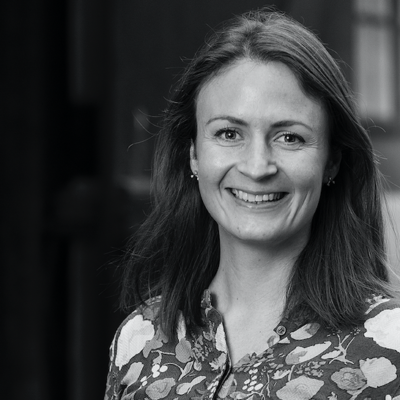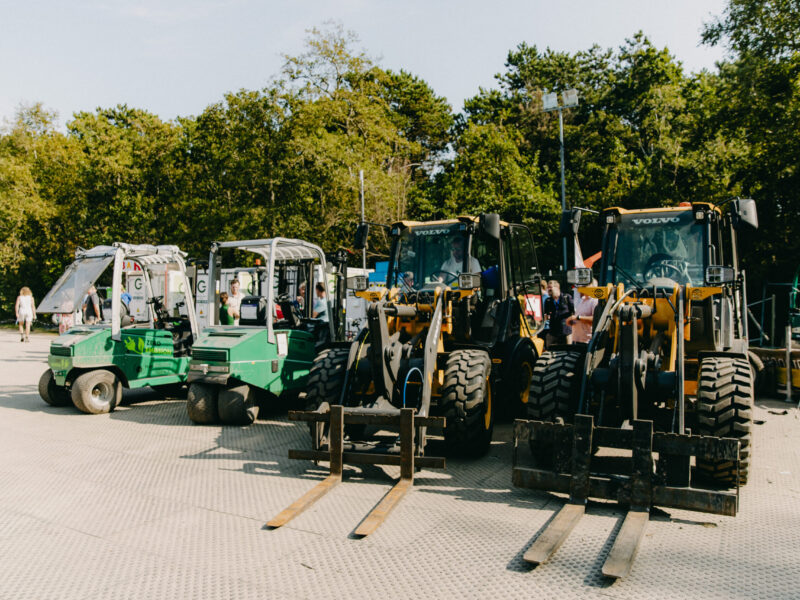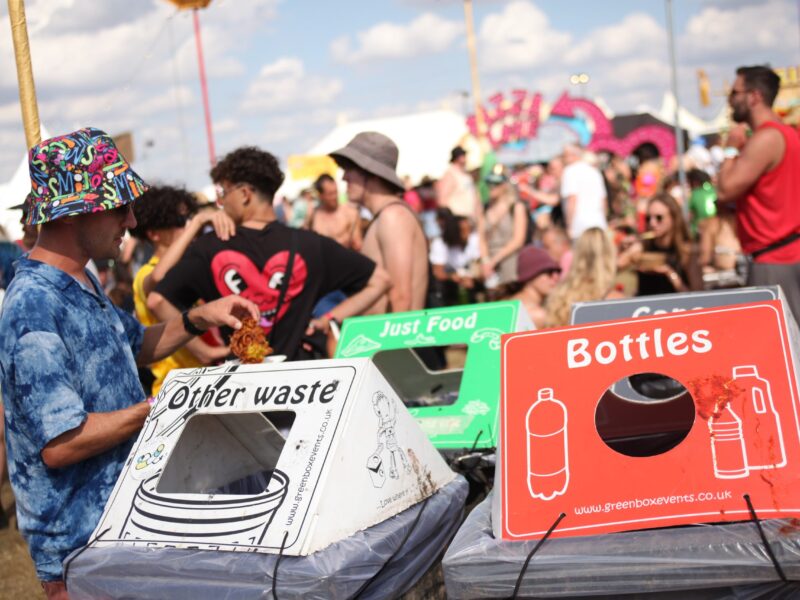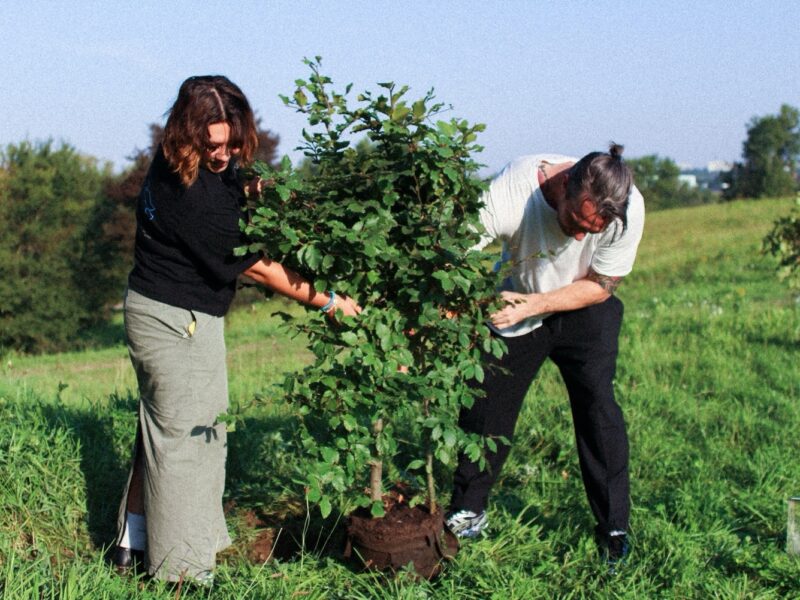
In the spotlight: The Circular Lab bij Roskilde Festival
This article was originally published by Bethan Riach over at Vision2025 and can be found here.

Introducing: Kristine Barenholdt Bruun
Kristine Barenholdt Bruun is Head of the Circular Lab at Roskilde Festival, she has worked in the field of sustainability and entrepreneurship for 10+ years including at BLOXHUB – the Nordic hub for sustainable urban development and she recently finished her studies from Cambridge University in Business Sustainability Management. The purpose of the Circular Lab at Roskilde is to give young, green entrepreneurs an opportunity to test solutions, products and business models that can contribute to the green transition of the society at large or at Roskilde Festival.
1. What is the proudest sustainability achievement or moment of your career?
We opened the Circular Lab last year and already this year no less than 28 young circular entrepreneurs tested their solutions at Roskilde Festival. They were so enthusiastic, had great solutions and gained a lot of crucial info about their products and target groups. Being there and seeing these young great sustainable minds in action made me very happy, proud and hopeful for our future.
2. What was your worst ever sustainability-related decision, project or initiative and why?
We’ve only had the Circular Lab for a year by now, so we haven’t had a lot of time to carry out really bad initiatives (yet!) I will be happy to share all of our future brilliant mistakes at a later point so that we can all avoid them in the future.
3. What are you excited about implementing this year?
The Circular Lab! It was our first time at Roskilde Festival and the first time that we had a whole designated area. In the future I am looking forward to working together with more testing platforms during the rest of the year such as our innovation and knowledge festival GRASP in October.
4. Which environmental issue do you most care about?
Global warming.
5. What sustainable change have you made in your personal life that you are most proud of?
I almost don’t buy new clothes anymore. Only items such as underwear or running shoes. It’s difficult sometimes, but we have so many nice second hand stores, shared wardrobes, and such, so it’s mostly a question of changing your habits.
6. What do you read to stay in touch with green issues?
In depth news and podcasts. In Denmark, Zetland manage to create serious, well told and engaging stories on the issues. I also enjoy following the coverage of green issues in VICE, which is a totally different style but definitely worth spending time on.
7. What is the most memorable live performance in your life?
Prince at NPG Arts and Music Festival in Denmark 2011! Objectively speaking, the concert was probably not his best, but I was at the front row, and he was amazing! So happy that I got to experience him live.
8. Was there a moment you committed to taking action on climate change?
I started my career in the building industry and where immediately exposed to the huge sustainability issues that the industry needs to tackle. The complexity of the issues is huge, and it became clear to me that the same level of complexity is present in other industries. I decided to further educate myself to make sure that I am capable to serve as a change maker in present and future positions.
9. What are the most important issues to tackle at your event?
Waste and transport are crucial issues, that we need to tackle. More than 50 percent of our waste comes from camping equipment; tents, pavilions and camping chairs. People leave it behind because the products are broken and very poor quality. This means that we need to find ways of controlling what is brought into the festival, for example by renting out better equipment to audiences.
10. What do you think is the most significant challenge for the events industry becoming more sustainable?
Transport, power supply and waste handling just to mention a few.
11. Can you share something sustainable from another artist or event or company that inspired you to make a change?
Burning Man has been a Leave no trace-festival since 1986 – I think that is pretty cool. At Roskilde Festival we have a Leave no trace area at the camping site and it is always interesting to see how clean and filled with green grass it is after the festival compared to other camping sites. My hope is that more areas will look like this in the future.
12. What is the secret to your sustainable success?
Collaboration between the festivals, the volunteers and the young green entrepreneurs.
13. Tell us something you feel positive about right now that relates to the environment?
This year Roskilde Festival said goodbye to all diesel-fuelled generators and bottled gas and connected to the Danish electricity grid. That was an important green transition.
14. Tell us a book, film or recent article you feel others should watch/read and why about positive change?
I like watching documentaries about nature; ‘The Memory of Fish’ is a good example of a beautiful documentary on the relationship between nature and people who embrace their total reliance on it.
15. Can you give people new to sustainability in events a top tip?
Most festival- and event organisations are shaped by an amazing “doer-mentality” which is great – because otherwise the festivals wouldn’t come to life every year. But we must remember that strategy, change management and taking 100 percent responsibility for our supply chains is equally important.
16. What is the favourite festival moment of your career?
The little talks I had with all with circular startups at Roskilde Festival, where they gave me feedback on their tests. I enjoyed to hear about their results, discoveries and also how they gained a new valuable network from testing their solutions at the Festival.
17. What habit or practice has helped you most in your personal journey in life?
Being clear minded, open to opportunities and able to see the possibilities.
18. Is there anything new or exciting you are planning or changing for the future that you can tell us about? Even a hint!
The Circular Lab will grow. We will test more solutions and we will more actively help the entrepreneurs when they are done testing. We will provide mentor help, knowledge share and help them prepare for the testing, so that we ensure that their tests will improve their solutions and businesses in general.
19. Will we save the world?
Yes. With a combination of innovation, decision making and collaboration the world will still stand – but obviously not be the same 100 years from now.
20. What would your sustainable superpower be?
Being able to capture CO2 right away and at a huge scale!






